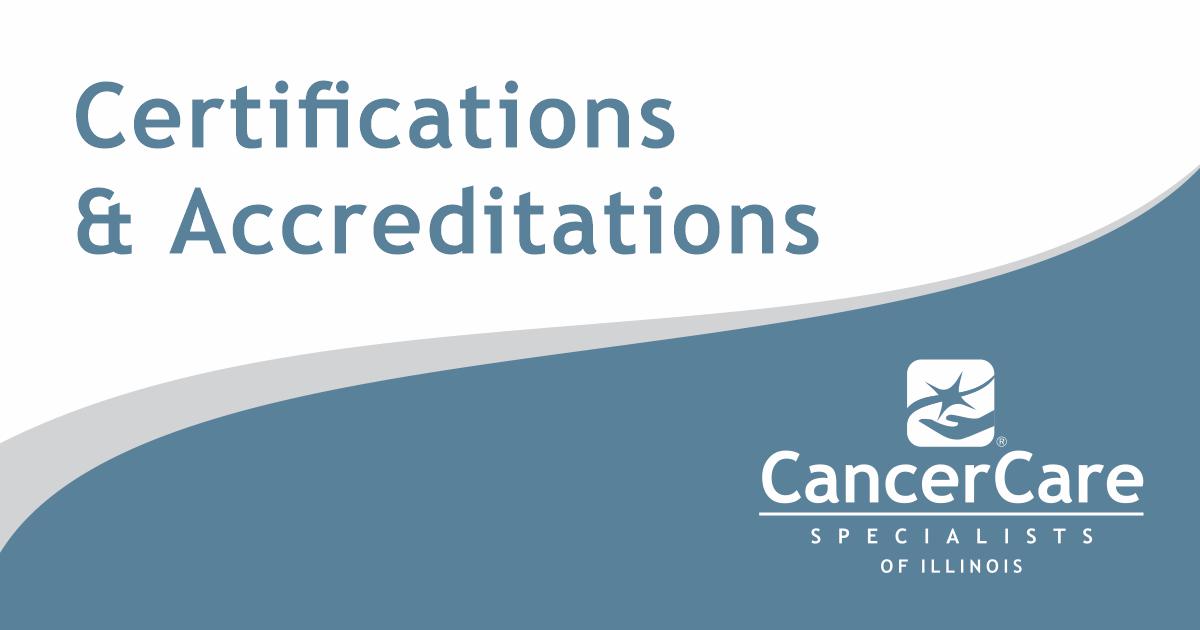
Cancer Care Specialists of IL is proud of our dedication to providing the best care. From our physicians, nurses, medical techs, pharmacists and staff, to our labs, pharmacies, facilities and complete practice – we believe our patients deserve high standards. Our certifications and accreditations provide peace of mind through our commitment to excellence.
American College of Radiology
ACR accreditation, awarded by the American College of Radiology, signifies the oncology practice’s commitment to delivering top-tier medical imaging services. This prestigious certification acknowledges the practice’s adherence to rigorous quality and safety standards, covering equipment, staff qualifications, and overall patient care. By achieving ACR accreditation, the practice not only showcases its dedication to excellence but also instills confidence in patients and referring physicians, assuring them of the highest quality of care, accurate diagnostics, and advanced technology utilization in oncology services.
Oncology Certified Nurses
The OCN certification, offered by the Oncology Certified Nurses (OCN) organization, signifies a nurse’s commitment to delivering top-quality care to oncology patients. This credential reflects specialized training in cancer treatment, symptom management, and patient support, ensuring that certified nurses are well-equipped to provide compassionate and expert care throughout a patient’s cancer journey. OCN-certified nurses are trusted professionals valued by patients and healthcare providers for their dedication to improving cancer care outcomes.
URAC – (Utilization Review Accreditation Commission)
URAC Pharmacy Accreditation, offered by the Utilization Review Accreditation Commission, is a distinguished recognition for pharmacies, including those within healthcare settings, such as oncology practices. This accreditation highlights the pharmacy’s commitment to delivering safe, effective, and patient-centered pharmaceutical care. URAC evaluates various aspects, including medication management processes, patient safety protocols, and adherence to best practices. Accredited pharmacies provide assurance to patients and healthcare partners that they maintain the highest standards of quality and safety in medication services, ultimately contributing to improved patient outcomes within oncology care.
ACHC (Accreditation Commission for HealthCare)
ACHC accreditation, administered by the Accreditation Commission for HealthCare, is a prestigious recognition for healthcare organizations, including oncology practices. This accreditation signifies the practice’s commitment to meeting rigorous standards of quality and patient care. ACHC evaluates various aspects of the practice, including clinical services, patient safety, and administrative procedures, ensuring that patients receive the highest level of care and support. Achieving ACHC accreditation demonstrates the practice’s dedication to excellence and instills confidence in patients and healthcare partners. It highlights the practice’s ongoing commitment to delivering exceptional oncology services and maintaining the highest industry standards.
QOPI (Quality Oncology Practice Initiative)
The Quality Oncology Practice Initiative (QOPI®) is a quality program designed for outpatient-oncology practices to foster a culture of self-examination and improvement. Administered by the American Society of Clinical Oncology (ASCO), this certification evaluates various aspects of oncology practice, including treatment standards, patient safety, and data reporting. QOPI-certified practices are known for their dedication to evidence-based care, adherence to clinical guidelines, and commitment to enhancing the quality of life for cancer patients. This certification symbolizes a practice’s unwavering dedication to excellence in oncology care and fosters trust among patients and healthcare partners.
CLIA (Clinical Laboratory Improvement Amendments)
CLIA (Clinical Laboratory Improvement Amendments) certification is a vital recognition for oncology practices that operate clinical laboratories. This certification ensures that the practice’s laboratories meet rigorous federal standards for accuracy, reliability, and quality in diagnostic testing. It underscores the practice’s commitment to providing precise and dependable laboratory services critical for cancer diagnosis, treatment monitoring, and research. CLIA certification assures patients and healthcare providers that the practice’s laboratory services adhere to strict regulatory requirements, ensuring the highest level of confidence in test results and contributing to better patient care and outcomes in oncology.
CCSI Laboratories are all CLIA certified as High Complexity Testing.
COLA (Commission on Office Laboratory Accreditation)
Centers for Medicare and Medicaid Services (CMS) and Joint Commission (TJC) have granted COLA with the deeming authority for laboratory accreditation. CCSI laboratories must meet and pass all of COLA requirements during inspection that occurs every two years in order to receive the COLA Certificate of Accreditation. The certificate demonstrates the quality system of organizations, patient care, healthcare workflows, laboratory quality, and the accuracy and reliability of the results produced by the laboratories. COLA-accredited laboratories are dedicated to providing precise and reliable test results crucial for cancer diagnosis and monitoring, ultimately enhancing patient care and trust in the practice’s laboratory services. This accreditation signifies a practice’s commitment to maintaining the highest laboratory standards and contributing to better patient outcomes in oncology care.
ASCP BOC (American Society of Clinical Pathologists Board of Certification)
ASCP BOC (American Society of Clinical Pathologists Board of Certification) certification is a prestigious recognition for medical laboratory professionals within oncology practices. Administered by the American Society of Clinical Pathologists, this certification validates the expertise and competence of laboratory staff, including pathologists and laboratory technicians, in the field of clinical pathology. ASCP BOC-certified professionals are known for their commitment to high standards of laboratory practice, ensuring the accuracy and reliability of diagnostic tests critical to cancer diagnosis and monitoring. This certification signifies a practice’s dedication to maintaining a highly skilled and qualified laboratory team, ultimately contributing to improved patient care and outcomes in the field of oncology.
AMT (American Medical Technologists)
AMT (American Medical Technologists) certification is a respected credential for medical professionals, including those working in oncology practices. Administered by the American Medical Technologists organization, this certification attests to the competence and proficiency of healthcare workers, such as medical laboratory technicians, phlebotomists, and medical assistants. Holding an AMT certification indicates a commitment to maintaining the highest standards of professional practice and ensures that healthcare personnel within oncology practices are well-equipped to deliver quality care and support to cancer patients. This certification enhances the practice’s reputation and underscores its dedication to employing skilled and certified professionals, which ultimately benefits patient care and outcomes in oncology.
CCSI medical laboratory scientists and technicians are certified by either ASCP or AMT.
